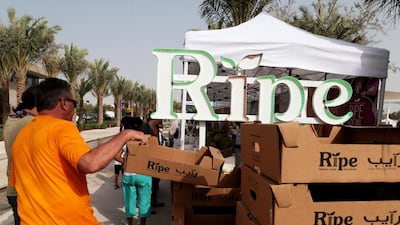ABU DHABI // Demand for organic food is growing rapidly in the emirates, according to a study conducted by UAE University.
Based on 300 respondents, the study attributed the rise to high per capita income, more awareness of healthy food and the diverse population.
“Consumers are willing to pay higher prices for certified organic food and that increases with age as they become more health conscious,” the study read. “Larger households and [Emiratis] are also more willing to pay for organic food than non-Emiratis, as the immigrants are usually low-paid workers and lack the necessary knowledge and resources to consume organic food.”
Dr Safdar Mohammed, UAEU chair of agribusiness and a contributor to the study, said he believed the trend began years ago.
“Consumers are a deciding factor,” he said.
“The three basic factors are income, education and the population. It’s been around in the UAE for the last few years but growth is not as it was expected because the production is still lacking.”
He blamed a lack of awareness by producers of organic farming systems.
“It needs a more specific growing system and they have to follow some regulations if they want to get certified,” Dr Mohammed said. “The Ministry of Environment and Water has been working with them in the last few years and this is what will bring the consumers’ trust. If they are asked to pay 30 to 50 per cent more, they want to make sure the product is organic. But we’re moving in the right direction and I know there is potential for organic in the UAE.”
The ministry is working with farmers to sell their produce.
“We need to develop more organic markets with the help of the private and public sectors,” he said. “We need to get more consumer trust on organic and maybe make more organic certification. We also need a lot of education and training programmes for farmers as they are still in the beginning stage of adopting this farming system so research and development is very important.”
Agricultural experts say the GCC is experiencing an increase in lifestyle-related health problems, such as obesity, diabetes and cardiovascular diseases. This has prompted some consumers to pay more attention to their diet and to favour healthier options, including organic.
“There is also the factor of relatively high levels of disposable income for some residents in the GCC, which often translates into increased demand for high quality, fresh and organic produce,” said Nicholas Lodge, managing partner at agriculture consultancy Clarity in Abu Dhabi. “So, for a combination of reasons, demand is increasing, with estimates for the growth in organic food indicating a market worth approximately US$1.5 billion (Dh5.5bn) by 2018, up from perhaps $300 million in 2009.”
He said the increased availability of organic produce and the development of specialist retail offerings, such as stand-alone shops and expanded sections in leading retailers and supermarkets, also played a role.
“In terms of organic farming in the region, significant expansion has taken place and to the extent that these farms focus on high-quality organic produce and employ modern farming practices, with less use of potentially harmful inputs, this is perhaps a good thing,” he said.
“Farming in the region needs to be undertaken with care and consideration for the environment, making sure to produce in a sustainable manner, where the farmer gets a fair price for his produce and inputs are carefully controlled.”
cmalek@thenational.ae

